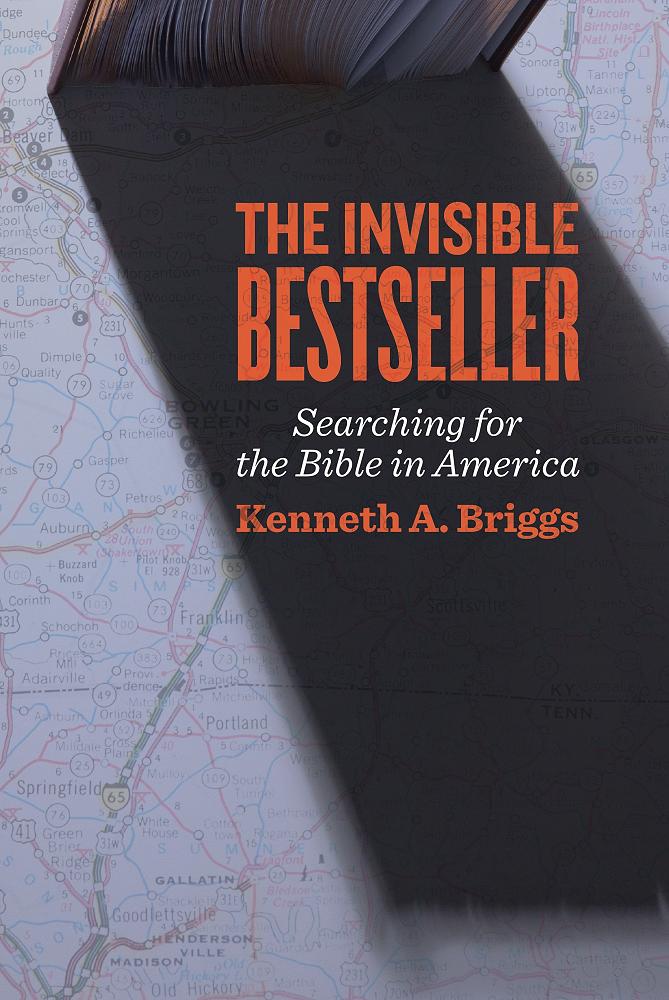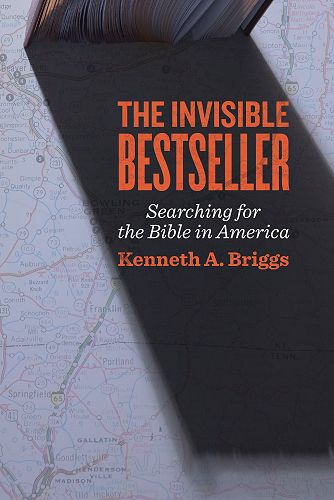
Book Review: The Invisible Best Seller: Searching for the Bible in America.*
Kenneth A. Briggs
The subtitle of this book, “Searching for the Bible in America”, aptly sums up the two main aspects of the book’s focus and style. On one level, it is an exploration of the place and prominence, or otherwise, of the Bible in American life and culture. At another level, it is the account of a personal journey throughout America to encounter the ways in which the Bible is used and affects people’s lives. It is largely the story of a loss of biblical literacy and of the Bible’s importance in American life. “My purpose in writing this book is to look for reasons for this decline [of the place of the Bible in American life] and to find where and how this disappearance makes a difference” (xvi).
In the first couple of chapters, Briggs sets the scene. There are some surprising facts: on average there are four or five editions of the Bible in every US household (in 2014, 88% of American homes had at least one Bible). Seventy-nine percent of Americans see the Bible as a sacred book, though this is down ten percent on the number who thought this a few years ago. There is a foray into an analysis of the various organisations’ (Gallup, Pew Charitable Trust) assessment of current church attendance, and discussion of the relative merits and usefulness of their methods. Mostly, however, the book is based on Briggs’s own interviews with people, and observation of various “locales” where the bible is in use: Churches, Bible Study groups, Bible colleges and seminaries, or university religion programmes. Briggs also considers the various ways in which the Bible (or content in the Bible) is purveyed: through digital means (apps), films, TV shows, musicals, theatre (including a one-man recitation of Mark’s Gospel), sermons and academic lectures, through the efforts of the Jesus Seminar, and through bible quizzes and memorisation contests.
The general thesis is that the role of the Bible as “keeper of the American soul”, and the place of the Bible, both in personal lives and in the public sphere, is on the decline. There is a rise in biblical illiteracy. The reasons for this are manifold: the American values of free enterprise and consumerism have driven the Bible to private rather than public life (so has not to compete with those values); individualism has led to a rise in personal interpretation of the Bible in the face of a concomitant decline in reading generally; the divide between “modernist historical-critical” scholarship and more literal reading of the Bible; the way in which both science and secularism have weakened a trust in the Bible’s inerrancy, or simply its relevance; the inability of many readers to understand it.
In a chapter entitled “Does It Make Any Difference?” (chapter three), Briggs canvasses different conceptions of God, and changes in the religious landscape, from one in which there was much more (supposed) homogeneity to a “smorgasbord” of different opinions, “spiritualities” and so forth. He charts the rise of secularism, and the theory of it as put forth by Charles Taylor (A Secular Age), and broken down in a lecture by a follower of Taylor’s, which shows that Christianity (and with it, interest in the Bible) has been “relativized” by an expanding number of modes and habits of religious expression. It is not entirely clear how this chapter relates to the book’s theme, except that the fortunes of the Bible are tied to the drift away from (Christian) belief to this state of relativism. As he traverses the landscape (and this is the case throughout the book), Briggs raises many questions that, by and large, remain unanswered.
In the remainder of the book, Briggs covers a range of topics, experiences, and observations ranging from a discussion of the merits of digital versions of the Bible and “Bible apps”, and whether they increase the reading of the Bible, and whether they, in fact, effect changes in people’s lives, or simply sit (mostly unused) on their devices; to a chapter-long description of the way in which the Scopes trial has affected the town of Dayton where it was held and how a 1960s film about the trial, Inherit the Wind, which unfairly painted the anti-evolution legal protagonist, William Jennings Bryan, as a “right-wing reactionary”, has left the town’s inhabitants wary of being seen as fundamentalist ignoramuses. This chapter also affords Briggs the opportunity to provide a description of the rise of historical-critical scholarship which undermined the sense of a unified Bible authored by God, a discussion of recent tensions amongst evangelicals over inerrancy, with a concomitant decline in the appeal of Biblical infallibility. Briggs describes the defection from the evangelical camp of such “stars” as Peter Enns and Bart Ehrman; dissension over literalist interpretations of creation by faculty of Bryan College (in Dayton itself) and rejection of these by an alumnus, Rachel Held Evans.
A chapter on the Society of Biblical Literature surveys the tensions that arose in the Society, exacerbated by an article written by a Jacques Berlinerblau, over what are seen as “strictly scientific” approaches to Biblical study and interpretation and those of a “confessional” nature. What is the relationship between academic standards and rigour and faith-based beliefs (particularly when scholars come from mainly Christian institutions, some of which require adherence to a statement of faith)? Berlinerblau, in making a pitch for objective scholarship untainted by adherence to faith-based considerations, stated that “The SBL should be to the Bible what FIFA is to soccer” (69); a somewhat unfortunate comparison perhaps, given the recent history of FIFA.
What provides real interest in Briggs’ survey are the many anecdotes he supplies. He has travelled widely: accounts include the way prisoners interact with the Bible, various snapshots of Bible study groups and their different modes of operating, from an up-the-front, “preaching mode” of presentation, to one where participants engage in sharing experiences (perhaps somewhat loosely tied to the biblical material), for example, a group of men looking at “longsuffering” mostly recount difficulties they have had in trying to “save” their unbelieving friends and acquaintances.
Briggs is a journalist, and writes in an easy, journalistic style. He often resorts to brief pen-sketches of individuals he meets: one, for instance, is described as “a wavy-haired dynamo with a lean frame and quick reflexes, he has recently turned forty and wears a genial, puckish expression...”(194); another “a lanky man with a long face and an expression that never defaulted to less than a smile...” (21). Sometimes, he oversimplifies matters, as when he gives the impression that the process of canonising the New Testament was a matter of ruling books in or out of a list of accepted writings over a three or four hundred year period. At other times, his analysis tends somewhat towards the “black-or-white” as, for instance, when he several times conveys the impression that there is no middle ground between a view of the Bible that sees it as completely divinely inspired, and a modernist, scientific, historical-critical approach in which it is a purely human book. He insists on calling biblical scholars “Biblicists”, which is an unfortunate use of a term generally applied to more conservative or “fundamentalist” Bible readers. At other times, he provides a pungent, sharply observed comment, as for example this summary of “an ahistorical Jesus only sketchily traced to New Testament documentation”: “A dis-em-Bibled Jesus, a Jesus without many Gospel trappings (obligations), more often occupies the center of high-energy worship” (57).
Does this book have anything to say about the state of the Bible in New Zealand? Much of it is very specific to America. But, no doubt, the concerns raised of rising biblical illiteracy, the fact that the Bible is more often honoured as sacred than read, the lack of application to public life are as present here. Briggs discovers, and often through his encounters with ordinary Christians seeking to apply the Bible in their everyday lives, that there is hope for the future of the Bible. May that indeed be so.
Derek Tovey is the book review editor for Stimulus.
*To see the publishing details and ways the book is available please click on the image below
Gallery

